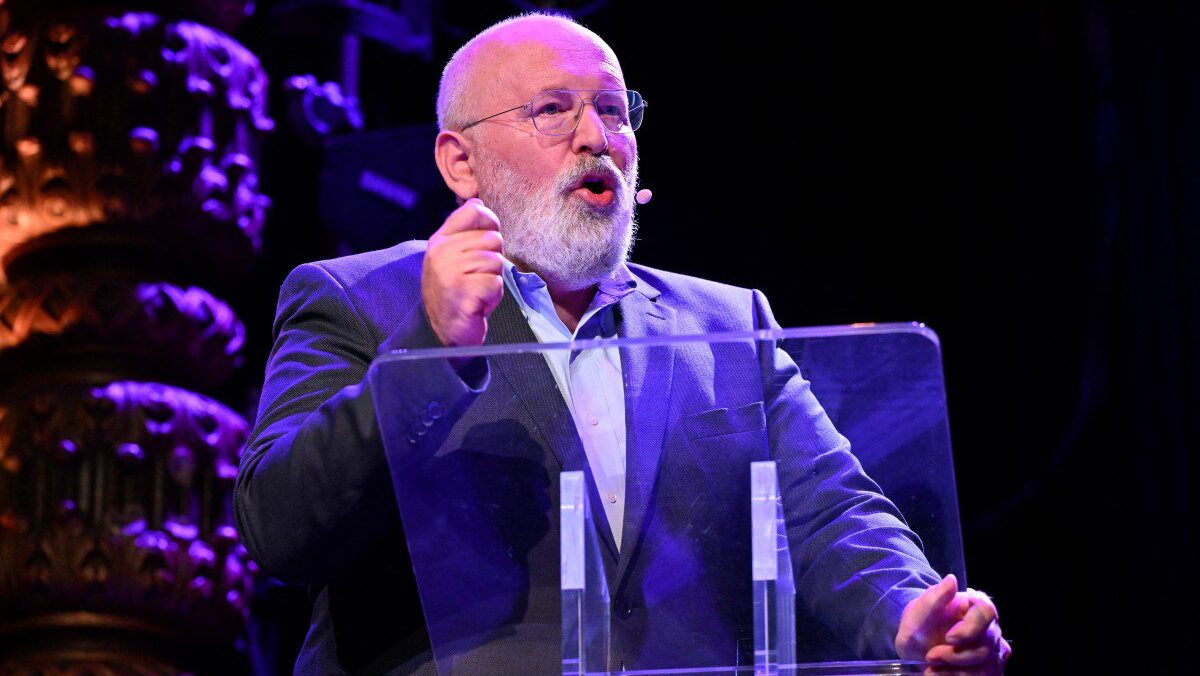
GroenLinks-PvdA’s leader Frans Timmermans speaks during a debate with Nieuw Sociaal Contract’s Pieter Omtzigt ahead of crunch national elections, in the eastern Dutch city of Arnhem on October 30th, 2023.
Photo: JOHN THYS / AFP
With the Dutch elections fast approaching, Frans Timmermans, the EU’s former Commissioner for Climate Action and a driving force behind its Green Deal, has used a colleague’s daughter’s death to bolster his case for a more stringent climate policy.
During a NOS-op-3 appearance—together with Nieuw Sociaal Contract’s Pieter Omtzigt—on Tuesday, October 31st, the PvdA/GroenLinks leader referred to a person, called Rosa, who had died in the floods of the Summer of 2021, caused by heavy rains, which hit the Dutch region of Zuid-Limburg, Belgium, and Germany.
She was there to fight for the climate and she was swept away by that river. I will never forget Rosa, because she was the same age as our youngest daughter. But she [his daughter] is now 17, Rosa [who died at the age of 15] will never reach that age. So the sense of urgency is great.
“The rainstorms during that time were really linked to climate change,” Timmermans said, adding that in Zuid-Limburg, they were fortunate that no one died, while “just across the border”43 people—among them Rosa—died in Belgium, and 196 in Germany.
It is not the first time Timmermans recalled Rosa. Last July, he also cited her case when he called for a commemoration service for climate victims to be held on an annual basis.
Earlier this year, Timmermans—then still as commissioner—attributed another person’s passing to climate change. He did this after a 51-year-old woman from Haarlem, who got caught in a storm called Poly, was killed in her car after heavy winds caused a tree to fall on her car. According to Timmermans, this was “a consequence of climate change,” but experts deemed any such link to be “nonsense.”
Talking to De Telegraaf, weatherman Wouter van Bernebeek said it was “simply a very coincidental and unfortunate confluence of circumstances,” and that the creation of such a storm is related to wind direction and wind speed and much less to temperature.”
Last July, Timmermans announced his farewell as commissioner to pursue the premiership in his native country’s elections come November to prevent newly created parties—such as the agrarian populist BoerBurgerBeweging and the immensely popular Nieuw Sociaal Contract—toning down, slowing down or otherwise opting out of various green policies.
During an earlier debate with NCS’s Omtzigt, held the night before—where Timmermans pledged that, as prime minister, he would deliver on a Green Deal within the first 100 days of his new administration—the two mainly disagreed on energy security and how climate and nature restoration policies should best be pursued.
Omtzigt takes issue with the current nitrogen policy (a contentious issue in the farming community, which for two years has been locking horns with the government), as it is based on abstract modeling—a tool too imprecise to determine for how much nitrogen each farm is in fact responsible.
In addition, while not opposed to reducing nitrogen in the environment or making the transition to renewables, he is wary of the pace and degree to which some seek to reach these goals.
In his plea for CO2 emissions to be reduced at a much faster rate, Timmermans has called for the subsidizing of fossil fuels to be abandoned. To take their place, Timmermans places his trust wholly in renewables (such as offshore wind farms and sun panels), but vehemently opposes the idea of the Dutch investing in nuclear energy, something he deems unnecessary for such a small country, as well as too costly.
Omtzigt, in turn, voiced concern about what he called a climate policy which, in recent years, had “been approached in an almost religious manner.” Omtzigt deems nuclear energy to have a future as it would guarantee energy security for the Dutch, especially since wind and sun are not reliable sources.
“If you believe nuclear energy is a good idea,” he said, addressing the crowd and voters at home, “you can come to me.”
Towards the end of the debate, Timmermans kept the door ajar for the formation of a cabinet with his PvdA/GroenLinks and Omtzigt’s Nieuw Sociaal Contract, both of whom are strong contenders in the upcoming elections.
“I see a lot of common ground. While on some points we will have tough negotiations, I do believe we can arrive at an agreement. After all, we live in a coalition country,” he said.
The Dutch take to the voting booth on November 22nd.
